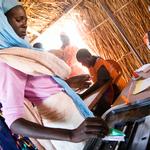Political Institutions in Africa. The Quest for Democratic Accountability
Lise Rakner

Electoral Mismanagement and Post-Election Violence in Kenya
Political instiutions in Africa: Zambia, Malawi and Uganda compared
Reconstructing traditional authority - for whom? Political parties, state
Understanding Patterns of Accountability in Tanzania
The Political Economy of the Budget in Malawi
The role of supreme audit institutions in Malawi, Tanzania and Uganda
Checking the State: the Role of Special Institutions of Restraint
The institutional context of the 2004 general elections in Malawi
The participatory aspects of poverty reduction strategies in Malawi and Zambia
Multiparty elections in Africa's new democracies
Political developments and the 2001 general elections in Zambia
The aim of this strategic institute programme is to take a new look at the processes of democratisation in Africa. To reach a deeper understanding of the obstacles and potentials of democratic consolidation on the continent the research programme analyses how, and under what conditions, political institutions in the region have evolved since the transition to multiparty rule. The research programme focuses on four central governance institutions: electoral administration; parliamentary- executive relations; political party development; and the role of the judiciary in Africa's new democracies.
In order to assess the impact of globalisation upon African institutional developments, a research co-operation is established between researchers from the Department of Comparative Politics, University of Bergen (CP) and the Chr. Michelsens Institute, Bergen (CMI). The programme includes the following core components:
- Research programme
- Competence building, including a teaching component and a recruiting component
- Infrastructure, networking between CP and CMI, and between north and south through research collaboration, workshops and conferences.
As part of the research collaboration, a study of the 2001 general elections in Zambia was recentely completed (Nov-2002). A study of institutional developments and voter behaviour in the context of the 2004 general elections in Malawi was initiated May 2002(funded by NORAD). As part of the POLINAF research programme, an analysis of Africa's special institutions of restraint will commence in October 2003.
Main ongoing activities:
- Elections and Political Processes in Zambia: the 2001 presidential and parliamental elections
- Democratic accountability in the context of the 2004 general elections in Malawi
- The democratic accountability function of independent institutions of restraint
- Annual course for graduate students at the University of Bergen. (2000-2006)
- Research collaboration, Department of Political Science and Administration, University of Addis Ababa, Ethiopia (L. Svåsand)




